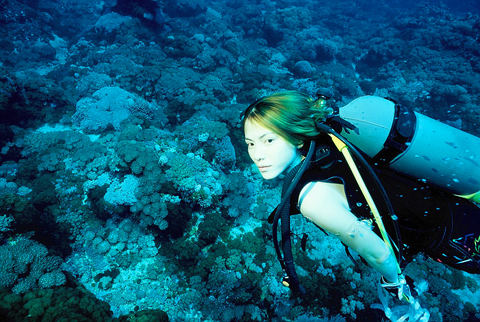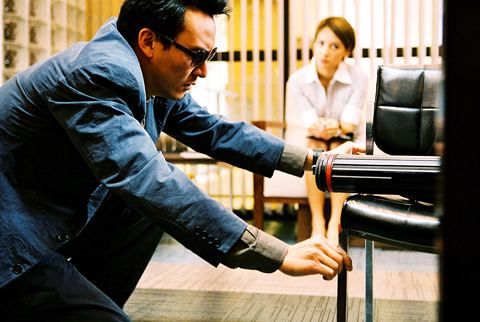The seabed stone formations discovered in the 1980s off Japan's Yonaguni Island, 111km directly east of Taiwan, have aroused controversy. Are they, as some theorists from the Morien Institute claim, the remains of an ancient culture? Or simply the work of natural processes? For filmmaker Tsui Hark (徐克), the mysterious structures provide a backdrop for Missing (謎屍), a romantic thriller starring Lee Sin-je (李心潔).
Despite a big-name cast, star director and enigmatic setting, the film suffers from a flabby storyline and vacillates unconvincingly between the romance and horror genres.
Lee plays Gao Jing, a psychologist living in Hong Kong who hits it off with underwater photographer Dave Chen (played by China's Guo Xiaodong, 郭曉冬).

PHOTO COURTESY OF STAR GROUP
Romance ensues, and Chen takes Gao on a diving trip to visit Yonaguni Island where he plans to propose to his true love.
But tragedy strikes on a dive when Chen loses his head. Literally.
Heartbroken and traumatized, Gao turns to hypnotherapy to retrieve the buried memories of what actually happened during the fateful dive.

PHOTO COURTESY OF STAR GROUP
Meanwhile, Chen's younger sister, Xiao Kai (Isabella Leong, 梁洛施), returns from Taiwan carrying a human head that she believes to be her deceased brother's and becomes possessed.
Gao's life spirals out of control when one of her patients, Simon (Chang Chen), convinces her of the existence of spirits. The psychologist finds it increasingly difficult to tell the difference between drug-induced visions, apparitions or illusions, as did this reviewer.
Missing opens with a promising premise but rapidly descends into convoluted plot devices with few genuine moments of horror, preventing viewers from suspending disbelief. There are unconvincing spirits, half-baked characters and an overwrought love story. Missing's end credits roll several anticlimaxes too late.
Taiwanese actor Chang Chen is one of the film's few pleasant surprises as he takes a break from his usual reticent leads to play an amusingly wacky sidekick.
Lee Sin-je, on the other hand, doesn't deviate from her usual scream queen expressions, and the deadpan Chang Chen-yue (張震嶽), who plays a marine archeologist, could have been left on the editing room floor without affecting the film's overall appeal.
Inspired by a documentary about the ancient underwater structures, Tsui reportedly spent three years and NT$300 million on Missing, which required advanced underwater cinematography equipment as well as a highly trained production team capable of underwater filmmaking. Though the effort involved is commendable, the results are not, which means the behind-the-scenes story of how the movie was filmed could be more enjoyable than the film itself.

A vaccine to fight dementia? It turns out there may already be one — shots that prevent painful shingles also appear to protect aging brains. A new study found shingles vaccination cut older adults’ risk of developing dementia over the next seven years by 20 percent. The research, published Wednesday in the journal Nature, is part of growing understanding about how many factors influence brain health as we age — and what we can do about it. “It’s a very robust finding,” said lead researcher Pascal Geldsetzer of Stanford University. And “women seem to benefit more,” important as they’re at higher risk of

Eric Finkelstein is a world record junkie. The American’s Guinness World Records include the largest flag mosaic made from table tennis balls, the longest table tennis serve and eating at the most Michelin-starred restaurants in 24 hours in New York. Many would probably share the opinion of Finkelstein’s sister when talking about his records: “You’re a lunatic.” But that’s not stopping him from his next big feat, and this time he is teaming up with his wife, Taiwanese native Jackie Cheng (鄭佳祺): visit and purchase a

April 7 to April 13 After spending over two years with the Republic of China (ROC) Army, A-Mei (阿美) boarded a ship in April 1947 bound for Taiwan. But instead of walking on board with his comrades, his roughly 5-tonne body was lifted using a cargo net. He wasn’t the only elephant; A-Lan (阿蘭) and A-Pei (阿沛) were also on board. The trio had been through hell since they’d been captured by the Japanese Army in Myanmar to transport supplies during World War II. The pachyderms were seized by the ROC New 1st Army’s 30th Division in January 1945, serving

Mother Nature gives and Mother Nature takes away. When it comes to scenic beauty, Hualien was dealt a winning hand. But one year ago today, a 7.2-magnitude earthquake wrecked the county’s number-one tourist attraction, Taroko Gorge in Taroko National Park. Then, in the second half of last year, two typhoons inflicted further damage and disruption. Not surprisingly, for Hualien’s tourist-focused businesses, the twelve months since the earthquake have been more than dismal. Among those who experienced a precipitous drop in customer count are Sofia Chiu (邱心怡) and Monica Lin (林宸伶), co-founders of Karenko Kitchen, which they describe as a space where they